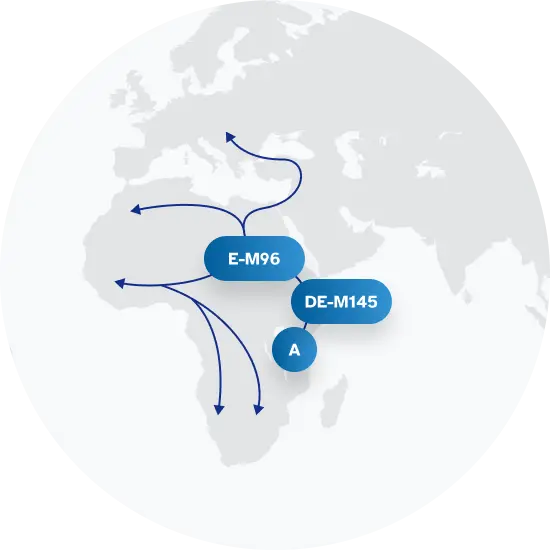Explore the Family Name Charles
How common is the last name Charles in the United States?
According to the Decennial U.S. Census, the popularity of the surname Charles has significantly increased from 2000 to 2010. In 2000, Charles was ranked as the 589th most popular surname, but by 2010 it had risen to the 548th position, marking a 6.96% increase in its rank. The actual count of individuals with this surname also saw an 18.81% growth during this period, jumping from 51,518 people in 2000 to 61,211 in 2010. This surge is further reflected in the proportion per 100k measurement, which indicates that for every 100,000 people, about 20.75 had the surname Charles in 2010, up from 19.1 in 2000.
| 2000 | 2010 | Change | |
|---|---|---|---|
| Rank | #589 | #548 | 6.96% |
| Count | 51,518 | 61,211 | 18.81% |
| Proportion per 100k | 19.1 | 20.75 | 8.64% |
Race and Ethnicity of people with the last name Charles
The data from the Decennial U.S. Census also provides insight into the ethnic identity associated with the surname Charles. It shows that between 2000 and 2010, there was an increase in the percentage of individuals with this surname identifying as Black (from 47.28% to 52.96%) and Asian/Pacific Islander (from 0.80% to 1.01%). However, there was a slight rise in those identifying as Hispanic, from 7.28% to 7.90%. On the other hand, the percentage of Charles who identified as White dropped from 38.87% to 33.69%. Those identifying as having two or more ethnicities also decreased from 3.71% to 2.37%. The data for American Indian and Alaskan Native remained relatively stable, with a slight increase from 2.05% to 2.07%.
| 2000 | 2010 | Change | |
|---|---|---|---|
| Black | 47.28% | 52.96% | 12.01% |
| White | 38.87% | 33.69% | -13.33% |
| Hispanic | 7.28% | 7.9% | 8.52% |
| Two or More Races | 3.71% | 2.37% | -36.12% |
| American Indian and Alaskan Native | 2.05% | 2.07% | 0.98% |
| Asian/Pacific Islander | 0.8% | 1.01% | 26.25% |
Charles ancestry composition
23andMe computes an ancestry breakdown for each customer. People may have ancestry from just one population or they may have ancestry from several populations. The most commonly-observed ancestry found in people with the surname Charles is British & Irish, which comprises 33.8% of all ancestry found in people with the surname. The next two most common ancestries are French & German (17.8%) and Nigerian (10.6%). Additional ancestries include Ghanaian, Liberian & Sierra Leonean, Spanish & Portuguese, Ashkenazi Jewish, Angolan & Congolese, and Indigenous American.
Ready to learn more about your ancestry? Get the most comprehensive ancestry breakdown on the market by taking our DNA test. Shop 23andMe
| ANCESTRY BREAKDOWN | COMPOSITION |
|---|---|
| British & Irish | 33.8% |
| French & German | 17.8% |
| Nigerian | 10.6% |
| Other | 37.8% |

Possible origins of the surname Charles
Your DNA provides clues about where your recent ancestors may have lived. Having many distant relatives in the same location suggests that you may all share common ancestry there. Locations with many distant relatives can also be places where people have migrated recently, such as large cities. If a large number of individuals who share your surname have distant relatives in a specific area, it could indicate a connection between your surname and that location, stemming from either recent ancestral ties or migration.
Based on 23andMe data, people with last name Charles have recent ancestry locations all within the United Kingdom of Great Britain and Northern Ireland.
| RECENT ANCESTRY Location | Percentage |
|---|---|
| Greater Manchester, United Kingdom | 56.50% |
| Greater London, United Kingdom | 56.50% |
| Merseyside, United Kingdom | 56.30% |
| Glasgow City, United Kingdom | 56.10% |
| West Midlands, United Kingdom | 55.80% |
What Charles haplogroups can tell you
Haplogroups are genetic population groups that share a common ancestor on either your paternal or maternal line. These paternal and maternal haplogroups shed light on your genetic ancestry and help tell the story of your family.
The top paternal haplogroup of people with the surname Charles is E-P252, which is predominantly found among people with Sub-Saharan African ancestry. Haplogroup E-P252 is descended from haplogroup E-M96. Other common haplogroups include R-CTS241 and E-M4254, which are predominantly found among people with European and Sub-Saharan African ancestry. Other surnames with similar common haplogroups are: Jackson, Banks, Robinson, Brown, Johnson, Joseph, Mitchell, Green, Williams, Taylor.
The most common maternal haplogroups of people with Charles surname are: H1, T2b, H. These most commonly trace back to individuals of European ancestry.
 Paternal Haplogroup Origins E-M96
Paternal Haplogroup Origins E-M96
Your paternal lineage may be linked to Ramesses III
Pharaoh Ramesses III defended Egypt in three consecutive wars during his approximately 30-year reign, but provoked dissent within his administration. Catalyzed by mounting internal strife, one of Ramesses's lesser wives, Tiye, hatched a plot to have her son, Pentawer, usurp the throne by having Ramesses III murdered along with his appointed heir. A papyrus record of the resulting trial explains that the plot failed and that all involved were tried and convicted.However, a modern CT scan of Ramesses III's mummy revealed a deep slit in his throat, reopening a case long thought closed. The embalmers went to great lengths to cover up other wounds, including fashioning a fake toe out of resin where Ramesses's real one had been hacked off, likely during a fatal attack. For thousands of years, Ramesses's burial adornments concealed the wounds that mark one of the most famous royal dramas in history. Ramesses III's paternal lineage belongs to haplogroup E-V38.
Your maternal lineage may be linked to Marie Antoinette
Because it is so dominant in the general European population, haplogroup H also appears quite frequently in the continent's royal houses. Marie Antoinette, an Austrian Hapsburg who married into the French royal family, inherited the haplogroup from her maternal ancestors. So did Prince Philip, Duke of Edinburgh, whose recorded genealogy traces his female line to Bavaria. Scientists also discovered that famed 16th century astronomer Nicolaus Copernicus traced his maternal lineages to haplogroup H.

What do people with the surname Charles have in common?
Spoiler alert: it's complicated. People with the same last name are usually no more genetically similar than a randomly sampled group of people from the same population. That said, people with the same surname are more likely to have similar ancestries than randomly sampled individuals. The reason is the tendency of people with similar cultural or geographical backgrounds to preferentially mate with one another. That's why people who share a surname may be more likely to share traits and tendencies in common than people within the general population. Check out the percentages below to see the prevalences of tastes, habits, and traits of people with your surname compared with prevalences among 23andMe users.
Preferences
Traits
Habits
Wellness
Are health conditions linked to the last name Charles?
The short answer is that, if there is an association between surname and health, it's usually more about your ancestry than your name. Individuals with a given surname are no more genetically similar than the general population but often have similar ancestries. The populations of people associated with those shared ancestries often have sets of genetic variations, also known as alleles, in common. Some of those alleles are associated with a greater likelihood of developing certain diseases.
Disease variant frequency by ancestry
Disease allele frequencies in populations associated with the surname Charles are shown below. Important Note: not everyone with a disease allele will develop these health condition



























